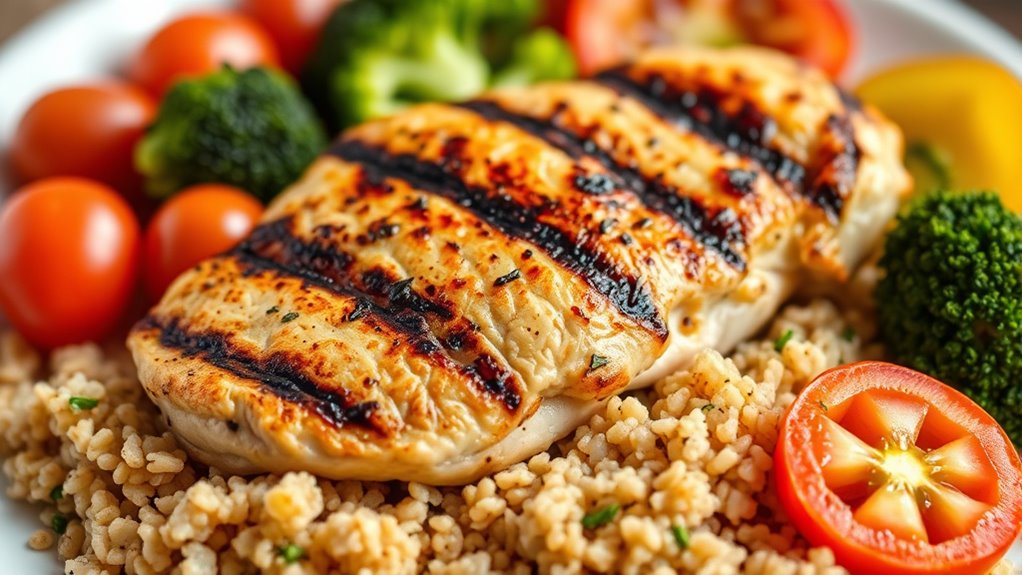To stay healthy, you need a daily amount of protein tailored to your age, activity level, and health. Most adults should aim for about 0.8 grams of protein per kilogram of body weight, but active individuals or those with specific needs might require more. Consuming a variety of protein sources like lean meats, dairy, legumes, and nuts helps guarantee you get enough of the essential amino acids. Keep exploring to learn how to optimize your intake for your goals and lifestyle.
Key Takeaways
- The recommended dietary allowance (RDA) for protein is about 0.8 grams per kilogram of body weight daily for most adults.
- Protein needs vary based on age, activity level, health status, and muscle mass.
- Active individuals and athletes typically require more protein to support muscle repair and growth.
- Plant and animal sources can both meet protein requirements, often combined for complete amino acids.
- Consuming enough protein regularly is essential for tissue repair, immune function, and overall health.

Ever wondered what makes protein such a critical part of your diet? Proteins are the building blocks of your body, essential for a wide range of functions that keep you healthy and functioning at their best. They serve as the primary components of muscles, skin, enzymes, hormones, and even your immune system. Understanding the various protein functions can help you appreciate why consuming enough of this nutrient matters. Proteins play an essential role in repairing tissues, supporting growth, and maintaining your body’s structural integrity. They also facilitate chemical reactions by forming enzymes, which speed up key processes like digestion and energy production. Furthermore, proteins are involved in transporting nutrients throughout your body, such as oxygen via hemoglobin, and they help regulate fluid balance and pH levels. Because of these diverse roles, your body constantly needs a steady supply of amino acids—the building blocks of proteins—to carry out its daily tasks effectively. Maintaining proper protein intake is crucial for overall health and well-being, especially considering the importance of authenticity and self-identity in personal development.
When it comes to dietary sources, you have plenty of options to incorporate quality protein into your meals. Animal-based sources are among the most complete, meaning they contain all essential amino acids your body can’t produce on its own. These include lean meats like chicken, turkey, and beef, as well as fish, eggs, and dairy products such as milk, yogurt, and cheese. If you’re looking for plant-based options, there are plenty of nutritious choices too. Legumes like lentils, chickpeas, and beans are excellent sources, offering not just protein but also fiber and essential nutrients. Nuts and seeds, including almonds, chia seeds, and sunflower seeds, provide healthy fats along with protein. Whole grains like quinoa, brown rice, and oats also contribute to your daily protein intake, especially for those following vegetarian or vegan diets. Combining different plant-based proteins helps you get a complete amino acid profile, ensuring your body receives all the building blocks it needs.
You don’t have to rely solely on animal products to meet your protein needs; a balanced diet incorporating various dietary sources can effectively support your health. Paying attention to your intake based on your activity level, age, and overall health guarantees your body gets enough to perform its functions without excess. Whether you’re an athlete, a busy professional, or someone aiming for overall wellness, understanding the importance of protein and making smart choices about your dietary sources can make a significant difference. Remember, your body relies on a consistent supply of high-quality protein to stay strong, repair itself, and keep everything running smoothly.
Frequently Asked Questions
Can I Get Enough Protein on a Vegetarian or Vegan Diet?
Yes, you can get enough protein on a vegetarian or vegan diet. Focus on plant-based proteins like beans, lentils, tofu, tempeh, quinoa, nuts, and seeds. Incorporate a variety of these foods to meet your daily protein needs and support vegan nutrition. Planning your meals guarantees you get enough essential amino acids, so you stay healthy and energized without animal products.
Does Excess Protein Intake Harm My Kidneys?
Imagine someone enjoying a high-protein diet, thinking it’s harmless. In most cases, excess protein overload doesn’t harm your kidney health if you’re healthy. However, for those with pre-existing kidney issues, too much protein can strain the kidneys. So, if your kidneys are healthy, moderate protein intake is safe, but overdoing it might lead to kidney problems over time. Always consult your doctor for personalized advice.
How Does Protein Intake Vary With Age and Activity Level?
Your protein needs change with age and activity level. As you age, your body absorbs protein less efficiently, so you might need more dietary protein, especially if you’re active. Active individuals should focus on ideal dietary protein timing to maximize muscle recovery and growth. By balancing intake and timing, you support your body’s changing needs, ensuring proper protein absorption and maintaining overall health regardless of age or activity level.
Are Protein Supplements Necessary for Most People?
Protein supplements are usually not necessary for most people; your body absorbs protein efficiently from whole foods. Think of protein absorption as a well-oiled machine working best when you eat balanced meals. Supplements can be helpful if you struggle with meeting your daily needs or during specific times like post-workout, but timing matters. Generally, focus on nutrient-rich foods first before considering supplements, which should complement, not replace, your diet.
What Are the Best Plant-Based Protein Sources?
You should consider plant-based options like lentils, chickpeas, and black beans, which are excellent vegan sources of protein. Quinoa and tofu also provide complete proteins, making them ideal for a balanced diet. Edamame, hemp seeds, and chia seeds are nutritious options too. Incorporate these vegan sources into your meals to guarantee you get enough protein from plant-based options, supporting your health and dietary preferences effortlessly.
Conclusion
Remember, you are what you eat, so fueling your body with the right amount of protein is essential. Whether you’re aiming to build muscle, stay energized, or simply stay healthy, listen to your body’s needs. Don’t forget, Rome wasn’t built in a day, and small, consistent steps make a big difference. Keep your focus on balanced nutrition, and you’ll be on your way to feeling your best every day.









